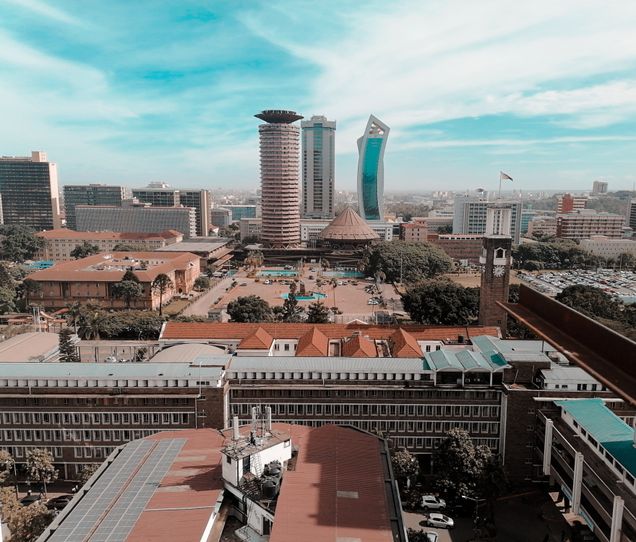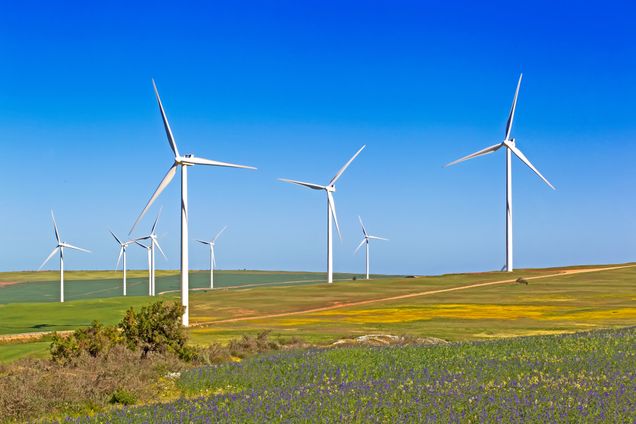GDP Center Round-Up: Africa Climate Summit & Finance in Common Summit

By Claire Paul
Following the hottest summer on record, policymakers, representatives from international financial institutions, researchers and civil society will gather for two key global summits from September 4-6: the Africa Climate Summit (ACS) hosted in Nairobi, Kenya, and the Finance in Common Summit (FiCS) hosted in Cartagena, Colombia.
The FiCS seeks to reinforce commitments in support of common actions for climate change and sustainable development, while in Nairobi, the ACS carries forward conversations from the Summit for a New Global Financing Pact to re-imagine a global financing landscape that can drive green growth on the African continent while supporting global renewable energy needs. Both summits keenly reflect the need for ambitious, collaborative action from a multitude of stakeholders, from development finance institutions (DFIs) to multilateral development banks (MDBs), private creditors and beyond.
Ahead of both summits, the Boston University Global Development Policy Center (GDP Center) has produced a suite of research on the role of DFIs in supporting green transitions, innovative solutions to address the looming sovereign debt crisis and to create space for sustainable development, the macroeconomic consequences of climate change in Africa and more.
Below, see a summary of the latest research:

Africa’s Inconvenient Truth: Debt Distress and Climate-Resilient Development in Sub-Saharan Africa
Due to multiple external shocks since the outbreak of COVID-19, sub-Saharan Africa (SSA) is facing acute debt distress and new highs in the cost of foreign capital at exactly the time it needs to mobilize a stepwise level of financing to invest in human, physical and natural capital to meet the region’s development and climate goals for the 21st century.
A new working paper published by the Debt Relief for a Green and Inclusive Recovery Project outlines the relative levels of sovereign external debt and service payments between 2023-2030 for SSA countries by calculating the fiscal space level left to meet climate and development financing needs during the same period. The authors find that comprehensive debt relief alone will not be enough, and the SSA region will need new forms of liquidity, concessional and grant finance to complement and bend down the cost of capital.
Given the lack of voice and representation that the region has in the international economic architecture, the report recommends that advanced economies lead in reforming the global debt architecture and providing relief to developing economies. Further inaction will not only inflict material damage globally in the form of climate change and lost market opportunities, but also further erode the legitimacy of the architecture itself. Read the working paper.

Elevating ESG: Empirical Lessons on Environmental, Social and Governance Implementation of Chinese Projects in Africa
China is an important partner in providing critically needed finance and infrastructure development capacity for African countries, but with a growing awareness of environmental, social and governance (ESG) risks associated with infrastructure development, it is important to consider to what degree development projects cause ESG-related harm to host countries and communities. To what extent are Chinese-financed development projects in Africa meeting China’s stated ESG guidelines?
A new report uses a consistent ESG framework based on stated Chinese and local ESG requirements and recommendations to analyze five Chinese projects in three African countries that are recipients of large amounts of Chinese financing on the African continent – Egypt, Nigeria and Ethiopia – and two sectors: energy and industrial parks, which are aligned with China’s ambitions to enhance energy access and support manufacturing in Africa. The report also assessed the case studies’ potential risks to biodiversity and Indigenous lands, based on their spatial locations.
The report finds that the case study projects do not meet the standards of China’s recommended ESG guidance, signaling significant room for improvement.
The report is a collaboration between the GDP Center, the Fudan University Green Finance and Development Center, the South African Institute of International Affairs and LSE IDEAS. Read the report and the blog summary.
The International Monetary Fund, Climate Change and Development: A Preliminary Assessment

As the international institution charged with maintaining global financial and monetary stability, the International Monetary Fund (IMF) has a vital role to play in ushering in a green transition that is as swift as it is just.
A recent report from the Task Force on Climate, Development and the IMF provides an independent, preliminary assessment of the IMF’s efforts to mainstream climate change. The assessment is evaluated through the development-centered lens articulated in the Task Force’s initial strategy report and advances actionable policy recommendations for the IMF and its stakeholders.
While the IMF has made strides in mainstreaming climate change into its operations, the Task Force finds that the IMF must show greater leadership on climate change and development across its bilateral and multilateral surveillance as well as its lending toolkit. Read the report and the blog summary.
Macroeconomic Consequences of Climate Change in Africa and Policy Implications

Prior to the pandemic, Africa had begun to experience a slowed economic growth, with COVID-19 only worsening these adverse trends. What is more, the pandemic also struck at a time when Africa was making slow and uneven progress towards achieving the UN 2030 Sustainable Development Goals (SDGs), with the continent already under various forms of climate-related stress such as floods, droughts and locust invasions.
A recent technical paper from researchers at the African Economic Research Consortium (AERC) and African Center for Economic Transformation (ACET) seeks to analyze the macroeconomic impacts of climate change in Africa and the policy implications.
The authors show that climate change will have a devastating impact on African economies, where increases in temperatures will fuel inflation with further negative implications for food security and poverty. Yet, while the outlook appears grim, the authors argue the COVID-19 pandemic can be an opportunity for Africa to launch a green innovation-led recovery that would not only speed up growth, but also simultaneously address climate change and other environmental issues that threaten Africa’s future. Read the technical paper.
Macroeconomic Consequences of Climate Change in Africa and Policy Implications

With a substantial lack of energy access in SSA, the continent must balance the need to combat climate change with an urgency to develop the continent’s economies to alleviate hunger and poverty, which are exacerbated by the impacts of climate shocks on agriculture.
A new technical paper from AERC and ACET researchers explores the effects of climate change on growth, debt and sectoral output in Africa.
The authors found that the debt-burden in African countries could increase 2.4 times due to climate change induced shocks. Economic modeling suggests that carbon pricing could be an effective way to meet nationally determined contributions (NDCs), but if poorly-designed, carbon pricing mechanisms can have regressive effects, particularly on low-income households. Read the technical paper.
Renewable Energy Transitions in a Period of Debt Distress in Southern Africa: The Role of Development Finance Institutions

With significant investment, the Southern African Development Community (SADC) region could attain full energy access and 53 percent renewable energy capacity by 2040 while on its way towards zero-carbon growth. However, there is increasing concern that SADC countries have become economically vulnerable and increasingly unable to take on more external debt due to the ongoing constraints of the COVID-19 pandemic. Lockdowns associated with the pandemic were also disruptive to SADC’s energy sector across the entire electricity value chain, from the utility level to the national and regional levels, with the greatest impact falling on renewable energy capacity development.
A recent report by the Southern Africa Development Community Centre for Renewable Energy and Energy Efficiency, the University of Pretoria Centre for Human Rights and the GDP Center explores the role of DFIs in enabling renewable energy transitions of SADC countries. The report is a synthesis of three virtual workshops held between June-October 2021 with international experts in energy, finance and development.
By outlining policy recommendations, the report highlights ways to enhance the SADC policy and regulatory environment and encourages further engagement by DFIs to keep renewable energy development on track to meet the target of 53 percent renewable energy generation by 2040. Read the report and the blog summary.
The Risks of the Wrong Climate Policy for Developing Countries: Scenarios for South Africa

While no country can stop global warming alone, developed countries can make the investments necessary to adapt to rising temperatures. Developing countries lack the technology, access to sufficient hard currency and the policy independence required to adapt. In South Africa, these challenges hinder not only adaptation but also the country’s ability to go through the energy transition necessary to avoid backlash from developed countries.
A recent journal article by Özlem Ömer and Jeronim Capaldo explores climate change scenarios faced by the South African economy, focusing on employment, productivity, income distribution, trade and fiscal balances. The authors chart a possible path for developing countries to survive the climate crisis, based on policies that create the necessary fiscal space. However, this path will require global coordination toward a common goal. Questions of who should contribute, how much and how remain, but the results clearly indicate the payoff can be persuasive for all. Read the journal article.
Generating Green Growth: Green Transformation in the Global South and Roles of Development Finance

As countries in the global economy are highly heterogeneous in terms of their contributions to the cumulative carbon dioxide (CO2) stock and the unequal distribution of harm and damage due to global warming, emerging markets and developing economies (EMDEs) are seeking and prioritizing balance between growth, poverty reduction and sustainability through green transformation by taking advantage of existing developmental finance flows.
A new working paper by Yan Wang and Yinyin Xu explores the best methods for EMDEs to augment renewable or green natural capital (GNK) to transform into green economies, finding that GNK is a neglected area of investment by multilateral and bilateral development financiers. Investing in forests, land, fisheries and protected areas and augmenting their values could reduce CO2 emissions and improve people’s income and welfare.
The authors found that development financiers have not provided adequate financing for GNK accumulation. They recommend that EMDEs’ GNK investment focus on long term ‘patient capital,’ which can be provided by multilateral and bilateral development banks, as well as host countries’ fiscal resources and national development banks. Read the working paper.
*
Never miss an update: Subscribe to the GDP Center Newsletter.